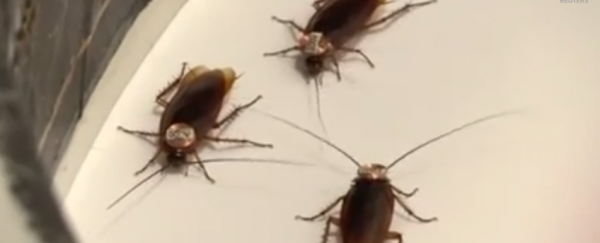New research has shown that, unlike other insects such as termites and ants, cockroaches have their own unique personalities, and can display traits such as bravery and shyness. This could help explain why the terrifying insects are so good at surviving pretty much anything. And it also means that they're even smarter than we feared.
Scientists from the Université Libre de Bruxelles examined around 300 specimens of American cockroach (Periplaneta americana) over three months. They were interested in how their behaviour was affected by group dynamics, as well as their own personal preferences.
They chose to study roaches, of all creatures, because of their quick decision-making skills - which anyone who has ever tried to come in slowly and squash one would be well aware of.
"Cockroaches are a simple animal but they can reach a complex decision with little information and with little interaction," said lead researcher Isaac Planas in the video below, which explains the study in more detail.
In each trial, tiny microchips were attached to the backs of 16 cockroaches, and they were released into an arena beneath a bright light. The arena contained two round "shelters" that provided much-needed cover for the dark-loving insects.
The team left the roaches alone for three hours and followed their behaviour via the microchips. Because cockroaches are known to hate light and love the protection of a group, you'd think that as soon as one cockroach sheltered under the cover, the rest would quickly follow suit. But they found that the amount of time it took for the cockroaches to seek shelter varied significantly.
Each cockroach was tested three times over a week in the arena, and after months of monitoring, it became clear that the actions of the cockroaches wasn't just being influenced by the rest of the group, it was also being influenced by their own personal preferences and characteristics.
Ultimately, individuals were responsible for whether they remained in the light or not. And this sets them apart from other insects, such as ants and termites, which seem to simply follow a social hierarchy.
As Reuters reports: "The researchers say the varying personalities of the cockroaches could explain their ability to adapt to new surroundings; with 'braver' cockroaches venturing out into new environments, while others remain behind to see if the surroundings are safe."
The team hope that these results, which have been published in the Proceedings of the Royal Society of London B, will help them understand more about a range of animals who show similar behaviour patterns.
"We have a group of equal individuals that reach a choice, can have consensus decision-making as we can see in sheep, bats, some monkey species, fish, birds, for example, or also humans in this case," Planas told Reuters.
His next step will be to analyse how cockroach behaviour and learning affects the group mentality. And, as fascinating as that all is, we're just as horrified to find out the results of that study too.
Source: Reuters
